Iran Provides Houthis with Anti-Ship Ballistic Missile: IRGC Media
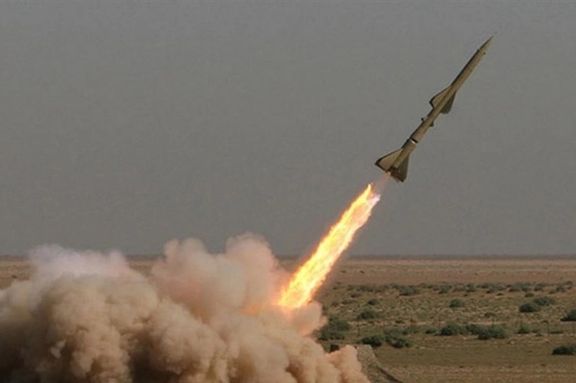
Tasnim News Agency, affiliated with Iran's Revolutionary Guard (IRGC), reported on Wednesday that Iran has supplied the Houthi rebels in Yemen with the Ghadr ballistic missile.

Tasnim News Agency, affiliated with Iran's Revolutionary Guard (IRGC), reported on Wednesday that Iran has supplied the Houthi rebels in Yemen with the Ghadr ballistic missile.
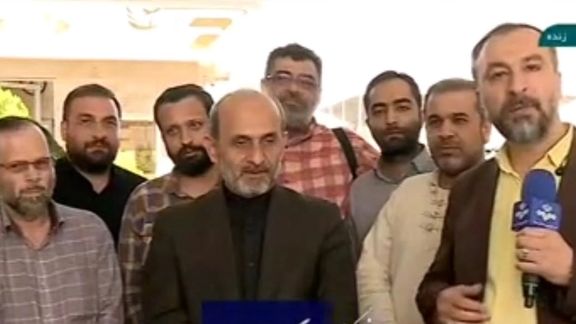
In a move against Iran’s attempts to politicize religious pilgrimages, Saudi Arabia has expelled six members of a media group linked to the office of Iran's Supreme Leader Ali Khamenei.
This follows Khamenei's recent emphasis on encouraging political activities among pilgrims during this year's Hajj, raising concerns about the Islamic Republic's efforts to spread its propaganda.
Iranian media reported that the individuals were detained while filming a program in Al-Masjid an-Nabawi, a holy site in Saudi Arabia where political activities are strictly prohibited. They were dispatched by an office controlled by Khamenei that deals with Hajj affairs.
The group were detained in Saudi Arabia for a week before being released and sent back to Iran, according to Iranian media reports.
The group, which includes former director of IRGC-linked Ofogh TV Salim Ghafouri, Shafi' Sho'lekar, Mehdi Mo'ayedi, Mehdi Amiri, Pouria Soleimanzadeh, and Alireza Taban, were reportedly sent to Dubai on Tuesday evening and arrived in Iran the following day.
The head of the Islamic Republic of Iran Broadcasting (IRIB) personally welcomed the team at Tehran’s airport and confirmed that the six members were sent back to Iran following the intervention of Saudi authorities.
Jebelli said he was unaware of the reason for the arrests, but noted that the group had been expelled from Saudi Arabia without performing the Hajj pilgrimage.
He also stated that Iranian authorities, including the Ministry of Foreign Affairs, the Supreme Leader's Representative for Hajj Affairs, and the Iranian Embassy in Saudi Arabia, had been following up on the matter.
He emphasized that Iranian media personnel are regularly sent to perform the Hajj pilgrimage legally and that this incident was unprecedented.
In November, Saudi Arabia temporarily barred Iranian propagandist Ali-Akbar Raefipour from leaving the country as he tried to return to Iran after Hajj pilgrimage. Hardliner Raefipour who promotes apocalyptic views based on Shiite eschatology and the coming of promised savior Mahdi is known for his conspiracy theories.
According to IRIB News, Saudi police also arrested two more Iranian journalists, one from Al-Alam News Network and the other from IRIB News Agency, two days after detaining the first group.
The journalists were reportedly arrested "without cause" as they were getting out of their car to attend a Du'a' Kumayl ceremony, a mainly Shiite supplication, at the Iranian pilgrims' hotel.
IRIB did not provide any information on the whereabouts or condition of the two detained journalists.
Also on Wednesday, Tasnim News Agency, affiliated with the Revolutionary Guards, reported that other Iranian journalists reporting on the Hajj pilgrimage remain in Saudi Arabia and have not faced any issues.
Iran has traditionally tried to politicize the hajj pilgrimage by organizing marches, chanting and demonstrations by pilgrims.
Earlier in May, Supreme Leader Ali Khamenei delivered yet another anti-US and anti-Israeli speech, implicitly also attacking Saudi Arabia, saying that "Anyone who extends a hand of friendship to America and Israel is an oppressor."
The May 6 speech that was meant to be a guide for Iranians planning to go to Hajj pilgrimage turned out to be mainly about regional issues linked to the possible rapprochement between Saudi Arabia and Israel.
Referring to a term coined by his predecessor Ruhollah Khomeini, "Distancing from the infidels," which strained ties between Iran and Saudi Arabia and resulted in the death and injury of tens of pilgrims due to the chaos caused by Iranian government agents in Mecca during the Haj pilgrimage in 1987, Khamenei described this year's Haj agenda for Iranian pilgrims as "distancing from the criminal Zionist enemy and its supporters."
This marked a return to the hostile rhetoric that was softened by Khamenei when Iran resumed its ties with Saudi Arabia in early 2023 after seven years, in a China brokered deal between the two countries.
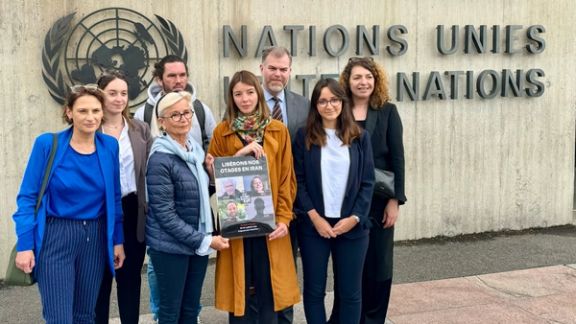
Families of three French citizens arbitrarily imprisoned in Iran without due process of law are urging the United Nations to apply pressure on Tehran for their release.
The relatives of Cecile Kohler, Jacques Paris, and Louis Arnaud, alongside their legal representatives, made a plea for their release outside the UN office in Geneva on Monday.
Noemi Koehler, the sister of Cecile Kohler, expressed deep concern over the deteriorating health of her sister and her partner, Jacques Paris, who have been detained for over two years.
"Today is an absolute emergency, their health is deteriorating, and it is time for this nightmare to end," she told AFP, emphasizing the urgent need for their release.
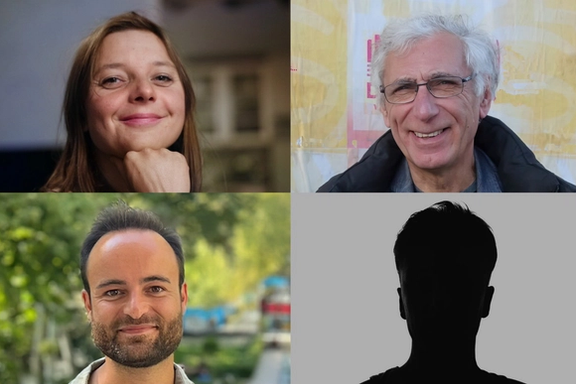
The French government has previously condemned Iran's use of foreign citizens and dual nationals as political pawns, criticizing Iran for adopting a policy of "state hostage-taking" and "blackmail". However, Tehran has dismissed these accusations as "interventionist and inappropriate."
Sylvie Arnoud, the mother of Louis Arnoud, echoed this urgency. "It is very important and necessary for us that their situation and arbitrary detention be recognized and that they be released as soon as possible," she said.
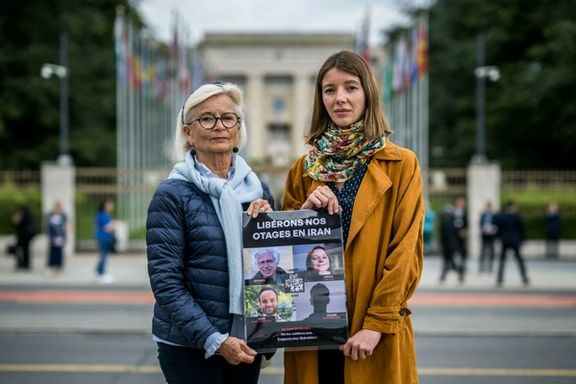
Arnoud, a banking consultant, was sentenced to five years in prison by an Iranian court last November. The French Ministry of Foreign Affairs condemned the sentence as "unacceptable," citing a lack of legal representation for Arnoud during the proceedings.
Kohler, a teacher of contemporary French literature, was arbitrarily detained along with her partner Paris during a trip to Iran on charges of “espionage”. The families argue that these charges are baseless and politically motivated, part of what they describe as Iran's "hostage policy" to exert pressure on Western governments.
Both Paris and Kohler were subject to inhumane detention conditions including forced false confessions on state TV - a tactic commonly employed by the Iranian intelligence ministry. In 2020, a study by rights groups focused on human rights in Iran revealed that Iran’s state TV had aired over 350 forced confessions in the last decade on behalf of Iran’s security services.
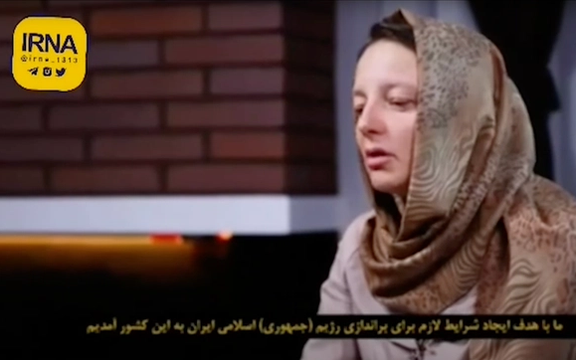
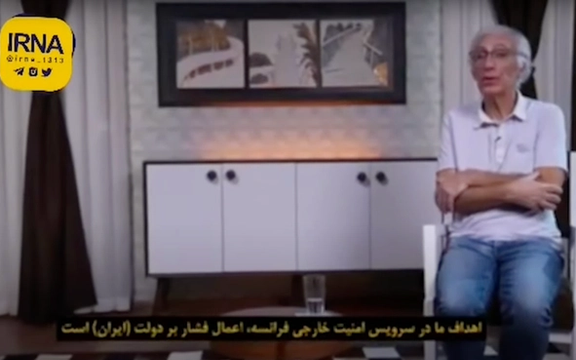
In addition to Kohler, Paris, and Arnoud, another French citizen, known only as Olivier, is also imprisoned in Iran. His full identity remains undisclosed.
The families, accompanied by their lawyers, met with members of the UN's Working Group on Arbitrary Detention, an independent panel mandated by the UN Human Rights Council.
Martin Pradel, one of the lawyers, argued that the detentions violate international conventions that Iran is party to, deeming the arrests arbitrary.
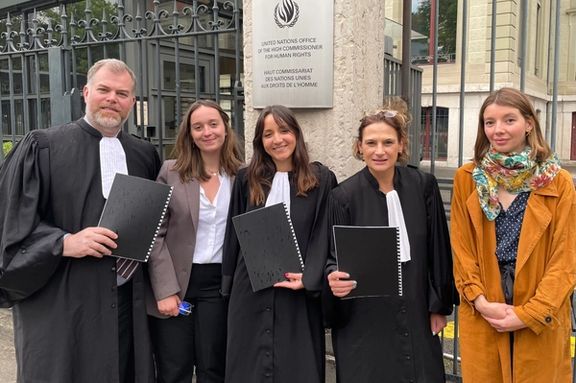
"We are in a hurry because we know that the conditions of their detention are very difficult," Pradel stated, hoping for a swift and decisive response from the UN working group by summer. Pradel further wrote on X that “Iran must stop its 'hostage diplomacy.'”
Louis Arnaud Support Committee - Arnaud’s loved ones' online petition to free Arnaud has gained 130,000 signatures so far. Marking Arnaud’s 607th day in detention, the Committee urged the public “to continue the chain of solidarity” by signing the petition, tagging French President Emmanuel Macron.
Noemie Kohler has also petitioned to Macron for help in bringing back her sister and Jacques home, calling on “France to do everything possible to obtain their release as a matter of urgency”. The petition further adds that during the entire two years of detention which included several months of solitary confinement, the Iranian authorities “only granted them three brief consular visits” and denied legal representation.
"We want the French President to understand that he needs to get angry and simply say that this situation is unacceptable," Pradel emphasized.
Meanwhile, French President Emmanuel Macron raised eyebrows again on Tuesday when he expressed sympathy and condolences to the relatives of the man known as Tehran’s Butcher, the late Ebrahim Raisi. Raisi served as Iran’s President when the French citizens were arbitrarily detained and tortured.
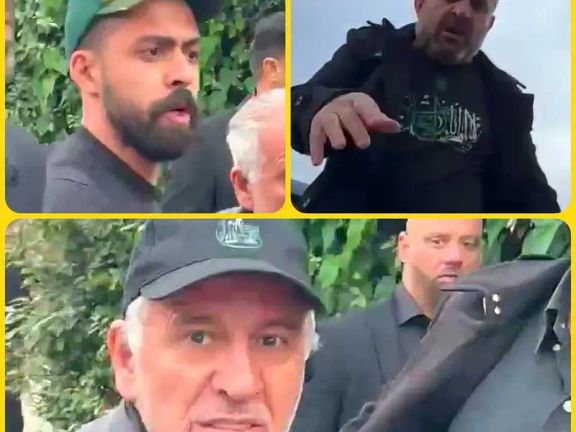
Deputy US Special Envoy for Iran, Abram Paley, has voiced concern regarding Iranian government supporters attacking peaceful protesters demonstrating around the world against the regime.
“Freedoms of peaceful assembly and expression are essential human rights, and efforts to silence these voices are unacceptable.”
On Tuesday, a US court issued a temporary order against Ramezan Soltan-Mohammadi, an employee of the Islamic Republic's Interests Section in Washington DC. Soltan-Mohammadi was caught on video threatening Iranian protesters with death during a May 22 rally outside a memorial service for Raisi in Maryland.
The court's order prohibits him from making any contact, threats, or approaching the residences and workplaces of the protesters, as reported by the National Solidarity Group for Iran.
However, Iranian Americans are asking the Biden administration for a more forceful response to the incident, some demanding that Mohammadi should be expelled from the United States.
In another event, an Iranian protester sustained a severe spinal injury following an attack by Islamic Republic loyalists in London on Friday. The attack, targeting a group of Iranian dissidents celebrating the death of Ebrahim Raisi outside a community center run by regime loyalists, resulted in injuries to at least four people.
The attack has sparked widespread condemnation from political activists and opposition figures such as Iranian exiled Prince Reza Pahlavi and leading activist Masih Alinejad.
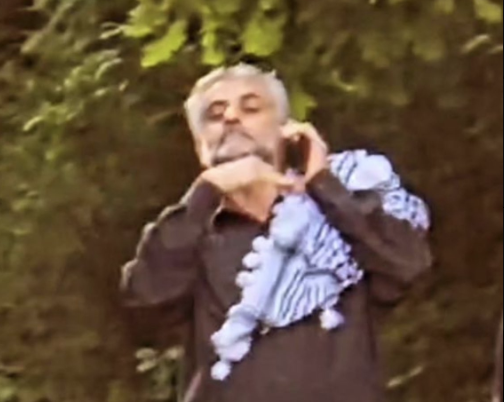
A US court has issued a temporary order against Ramezan Soltan-Mohammadi, an employee of the Iran's Interests Section in Washington DC, who was seen threatening Iranian protesters to death last week.
In a video posted to social media, the man is seen making a death gesture according to one of the demonstrators in attendance, Siamak Aram, who said the man in the video directed the death gesture right at him.
"He threatened me with death by moving his hand across his throat to indicate he would cut my throat," said Aram.
The video was taken on May 22 at a rally outside a memorial service hosted by the Islamic Education Center (IEC) in Maryland for the "occasion of the martyrdom" of President Ebrahim Raisi and Iran's late foreign minister, Hossein Amir-Abdollahian, who both died in a helicopter crash last week. The center posted "condolences and sympathies" notes on their deaths.
Aram, an activist from Iran who left in 2011 to avoid the Islamic Republic's reach, yet this week's incident he said, proved the arm of Iran's repression extends all the way to the United States.
"I didn't expect to feel the same experience I had in Iran, here in United States. It was...15 miles away from White House and the capital," he said.
The man, later identified by Aram as Soltan-Mohammadi, allegedly is an employee of the Interests Section of the Islamic Republic of Iran, which is part of the Pakistani Embassy in Washington DC, which is the de facto consular representation of Iran in the US.
Iran International has reached out to Soltan-Mohammadi for comment but has not heard back.
Jason Brodsky, the policy director of United Against Nuclear Iran (UANI) told Iran International "the fact that he was an employee of the Islamic Republic's Interests Section raises tremendous concerns for me."
"The Islamic Republic has a very checkered past of trying to engage in transnational repression in Western capitals," said Brodsky.
In August 2023, a Fox New Digital report revealed a three-page GOP letter detailing Iranian regime-linked mosques and centers in Maryland, Texas, Michigan and Virginia. It claimed that the Islamic Education Center in Maryland, secured funding from what it says is the Iranian regime-controlled Alavi Foundation and Washington-based Iranian Iman, Abolfazi Bahram Nahidian.
"It is unacceptable for an employee of the Islamic Republic's Interests Section in the United States to threaten an Iranian American on US soil. The Iranian- American community was using their First Amendment right, to protest, as we have in this country. And we cannot allow authoritarian states like the Islamic Republic to try to trample on those rights on American soil," said Brodsky.
The incident allegedly involving Soltan-Mohammadi is just "a microcosm of a much larger Iran policy problem," said Behnam Ben Taleblu, a senior fellow at the Foundation for Defense of Democracies (FDD).
He said the Biden administration's policy towards Iran has been rooted in a belief that pressure drives the threats - rather than pressure being a tool to solve the threats.
The alleged death threats, according to Ben Taleblu, should serve as a wake- up call.
"I'm surprised and also worried. This is something that Iranian Americans and in general, Americans need to be concerned about, that foreign governments can actually benefit from diplomatic cover and adjudicate their fights with diaspora members, dissidents, and even just citizens of a different country on foreign soil," said Ben Taleblu.
He said, the core of the issue is the emboldenment the regime feels, not just in the US but across the Western world.
Just last Friday, the Islamic Republic's loyalists violently attacked a group of Iranian dissidents who were celebrating Ebrahim Raisi's death in London, injuring at least four people.
Ben Taleblu said the Islamic Republic's "threats vectors are evolving in drastic ways."
Earlier this year, two Canadian men with ties to Hells Angels were charged in what US authorities called a “murder-for-hire scheme” allegedly coordinated in Iran to kill Iranian dissidents in Maryland.
Ben Taleblu and Brodsky both commented to Iran International that the US State Department needs investigate and take action.
Iran International has reached out to the State Department, which would not provide comment at this time.
The Office of the Special Envoy for Iran posted to X Tuesday that it is "concerned to see reports of Iranian regime supporters threatening and attacking peaceful protesters worldwide."
Aram said he's just looking for justice.
He said he went to court Tuesday to send a message and exercise his democratic right.
"I hope that we could carry a very clear message that the rule of law prevails here. I wanted to make this message clear and also give the hope to the other dissidents of the Islamic regime," he said.
The court order prohibits Soltan-Mohammadi "from making any contact, threats, or approaching [Siamak Aram] my place of residence and employment," according to Aram whose lawyer posted the order to Instagram.
"You cannot be the member of the government. And also at the same time, making death threats to the citizens. Because if he was in power and if I was in Iran...he would execute the threat."
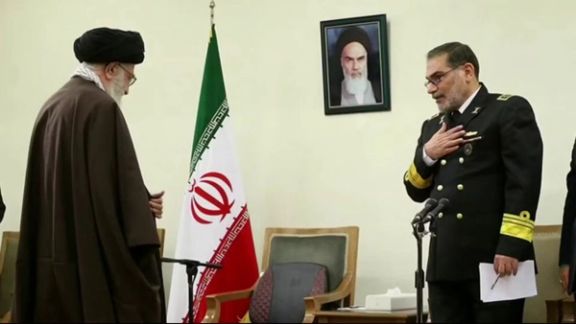
Two days after reports from Iran suggested that Ali Shamkhani, an adviser to the Supreme Leader, would become the new chief nuclear negotiator, a former official charged that he had previously opposed the 'revival' of the JCPOA.
Shamkhani is an old-guard military figure who served as the secretary of Iran’s Supreme National Security Council until last year. In that role, he oversaw negotiations to mend relations with Saudi Arabia. This background lends credibility to reports that Khamenei has chosen him to handle the nuclear issue, prompting significant reactions.
On Tuesday, however, several Iran-based news websites rehashed an interview from two weeks ago, in which Mahmoud Vaezi, the chief of staff to former President Hassan Rouhani, suggests Shamkhani was against the idea of reviving the JCPOA nuclear agreement, after it was ditched by Donald Trump.
"[Iran’s] Supreme National Security Council Secretariat during Shamkhani's term took a line of non-revival,” Vaezi says in his interview. “If the secretariat had been aligned [with Rouhani’s administration], the nuclear deal would have been revived at that time."
The reason why some outlets in Iran have highlighted this line from Vaezi’s interview remains unclear. It could be an effort by those in favor of a deal—and closer cooperation with the US in general—to undermine Shamkhani before his official announcement in the new role. Alternatively, if the appointment is already finalized, it might be an attempt to put Shamkhani on the defensive from the start. Either way, this appears to be another instance of factional politics that ultimately reinforces Khamenei's position as the ultimate arbiter.
Khamenei has the final say on all matters of security, intelligence and foreign policy. Many view his key appointments as windows into his thinking and an indicator of the direction that Iran would most likely take in the short to medium term. Those opposed to Khameni’s choice of direction can do little but to shoot the messengers –high ranking officials whose role is the implementation of policies developed in Khamenei's office, and who, more often than not, are where they are by virtue of their subservience.
Vaezi’s interview provides a glimpse of this factionalism and the dynamics of power in the Islamic Republic of Iran.
"Some individuals and the secretary in the secretariat adopted different methods. Some pursued policies that were not even discussed in the council meetings,” he says of the alleged disruptive impact of Shamkhani and his team during the negotiations to revive the nuclear agreement with the Biden administration. “As far as the nuclear deal is concerned, they had a line that it should not happen. They didn’t say it explicitly, but their behavior indicated this."
Vaezi then reveals why the situation could not have been rectified, why, in other words, it was out of President Rouhani’s hands.
“To replace the Secretary, there has to be an agreement between the President and the Supreme Leader,” he says in the interview. “That agreement didn't come about. Mr. Rouhani tried several times, about 5-6 times during his four years [second term]."
The nuclear negotiations between Iran and the International Atomic Energy Agency (IAEA) seem to have halted following the death of Iran’s president and foreign minister on May 19 when their helicopter crashed. But rumors persist –just as they have on a number of occasions in the past few years– that back-channel, indirect talks are underway between Iran and the US.
Shamkhani’s appointment as the 'chief negotiator' has yet to be officially confirmed. If and when it is, it will be significant primarily for what it reveals about the intentions of the true chief negotiator, Ali Khamenei.
The missile, described as the first Iranian anti-ship ballistic missile, is now in the hands of Yemeni fighters, enhancing their capability to target maritime vessels.
The revelation is significant as it confirms that Tehran has been arming its proxy forces in Yemen with advanced ballistic missiles.
This follows a pattern of Iran's military support to its allies in the region, further destabilizing the Middle East.
Tasnim's report also highlighted the history of the anti-ship ballistic missile's development, pointing out that Iran needs to be able to threaten US and other foreign navies in the broader Middle East.
In March, UK Defense Secretary Grant Shapps accused Iran of supplying ballistic missiles to Russia for use in Ukraine, highlighting Tehran's expanding role in global conflicts.
Since November, the Houthis have been using Iranian-supplied missiles and drones to attack commercial ships in the Red Sea, a critical global trade route. The attacks were initially a response to the Israeli military offensive in Gaza but have since severely disrupted maritime trade in the region.
The Houthi campaign in the Red Sea began after Iran's Supreme Leader Ali Khamenei called on Muslim nations to blockade Israeli trade.
Despite US and British military strikes on Houthi targets starting in January aimed at degrading their arsenal, the group’s attacks have continued.
The situation has been exacerbated by the expiration of UN Security Council restrictions on Iran's export of certain missiles, drones, and related technologies in October. However, the United States and European Union have maintained sanctions on Iran's ballistic missile program, citing persistent concerns over the proliferation of Iranian weaponry to proxies in the Middle East and to Russia.
This ongoing transfer of advanced military technology to the Houthis underscores the Iranian regime's commitment to extending its influence and military capabilities through proxy warfare, posing a significant threat to regional and global stability.